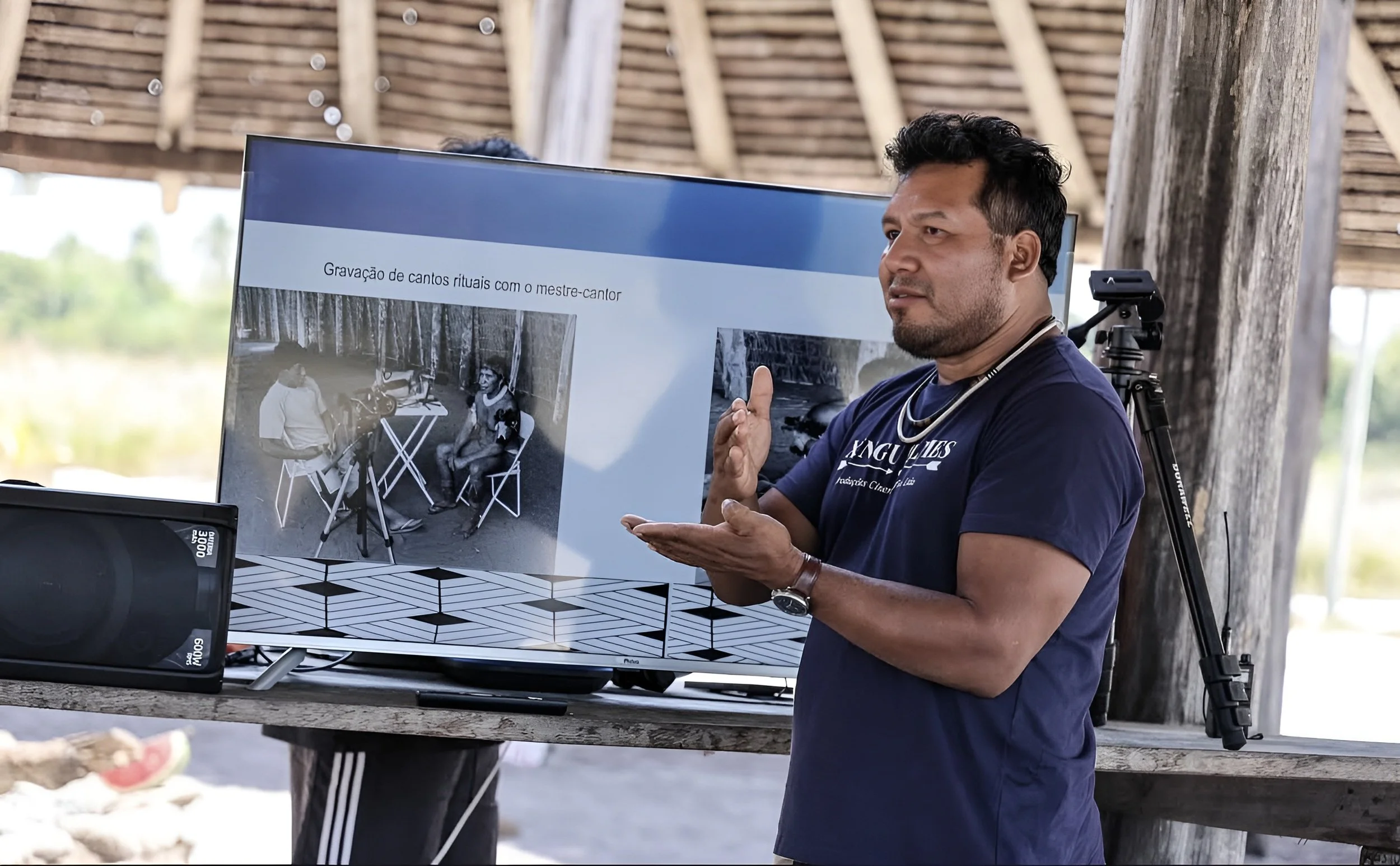
Spotlight.
Takumã Kuikuro
Creator in the Spotlight.
Takumã Kuikuro
Reclaiming the frame in Indigenous Cinema
Filmmaker, Community Leader, Cultural Innovator
Takumã Kuikuro
“We film not to impress outsiders, but to remember who we are.”
Takumã Kuikuro is a filmmaker, community leader, and cultural innovator from the Kuikuro people of the Upper Xingu region in Brazil. Working at the intersection of ancestral knowledge and contemporary technology, Takumã has become one of the most influential voices in Indigenous cinema today - documenting not just his community’s rituals and everyday life, but asserting the Kuikuro people’s right to tell their own stories on their own terms.
Raised in the village of Ipatse, Takumã’s introduction to filmmaking came through Vídeo nas Aldeias, a project that offered media training to Indigenous communities. From this initial contact, he forged a unique cinematic language - one rooted in Kuikuro cosmology, oral tradition, and collective authorship.
“Our stories have always existed,” he says. “What changes is that now we tell them with a camera.”
His co-directed documentary The Hyperwomen (As Hiper Mulheres, 2011) was a turning point. The film centers on a powerful female-led ritual, performed by Kuikuro women to preserve cultural memory and bring healing. Celebrated for its intimacy and respect, the documentary offered a new model of Indigenous-led filmmaking - participatory, grounded, and bold.
“It wasn’t a film made about us,” Takumã explains. “It was a film made by us - for ourselves, and for those who want to understand us on our terms.”
What sets Takumã’s work apart is his unwavering commitment to cultural sovereignty through cinema. For him, filmmaking is not just a creative practice - it is a tool of preservation, resistance, and transmission. His community-based archive of Kuikuro life is expanding each year with new material documenting rituals, ecological knowledge, and village histories.
“We are archiving our culture for our children, our grandchildren,” he reflects. “We film not to impress outsiders, but to remember who we are.”
Takumã’s vision extends beyond the village. He has brought Kuikuro perspectives to global platforms - from co-organizing the Brazil Indigenous Film Festival in London, to creating the short London as a Village during a residency at Queen Mary University. In the film, he humorously and insightfully reimagines the British capital through Kuikuro eyes, asking: “What if London were a village in the Xingu?”
He also helped initiate a groundbreaking cultural mapping project with Factum Foundation, using 3D scanning and photogrammetry to digitally preserve the architecture of his community. “Technology can serve memory,” he says. “But only if it is guided by the community itself.”
As co-founder of the Kuikuro Cinema Collective, Takumã trains and mentors young Indigenous filmmakers, ensuring that the Kuikuro language of cinema continues to evolve. “I want other young people from the Xingu to pick up the camera and show their world. Each one has their own voice.”
Yet his journey has not been without barriers. As an Indigenous filmmaker navigating both traditional and global media spaces, he often faces challenges around access, funding, and respect. “Sometimes, people from outside want our stories but not our leadership,” he observes. “They want to translate us, but we already speak for ourselves.”
Despite this, Takumã has become a force for change - not only documenting Indigenous life, but transforming the cinematic landscape itself. His work is not about representation alone; it is about reclamation.
Through his lens, we are invited not only to witness the Kuikuro world, but to reimagine cinema as a space of dialogue, self-determination, and deep cultural continuity. Takumã Kuikuro is not simply a filmmaker - he is a guardian of story, a keeper of collective memory, and a catalyst for Indigenous futures.
“We’ve always been filmed by others,” he says. “Now we hold the camera. And with it, we hold memory, dignity, and the future.”
More In Spotlight.







